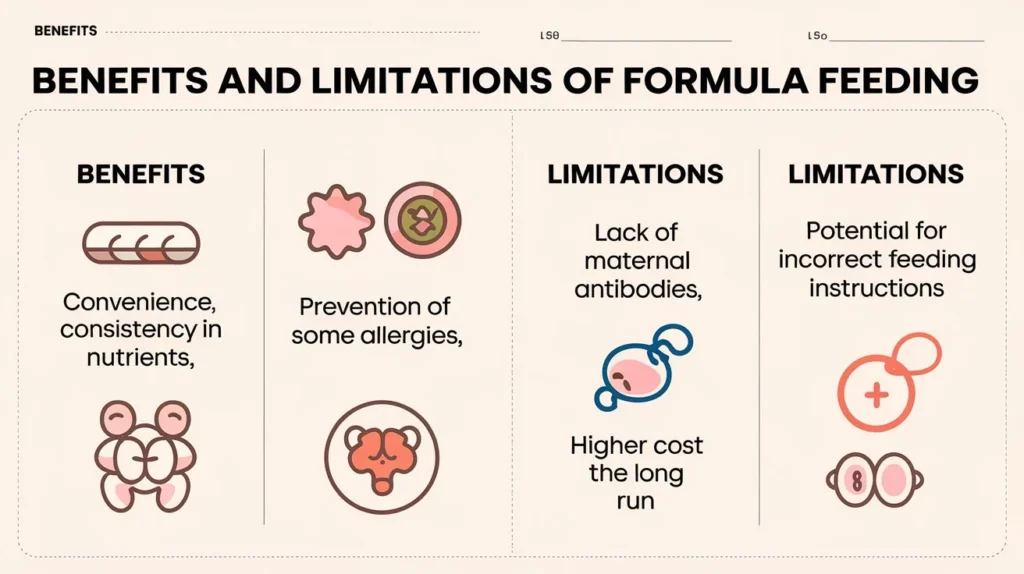When Should You Consider Switching to Formula Feeding?
Table of Contents
Introduction: Making the Right Feeding Choice
Switching to formula feeding is a significant decision many parents face when choosing how to nourish their newborn. While breastfeeding is often recommended for its nutritional and bonding benefits, some families consider formula feeding at different stages. Whether it’s due to health reasons, lifestyle factors, or personal preference, making the transition can feel overwhelming. This guide aims to support you through the process, offering a clear perspective on when formula feeding might be the right choice for you and your baby.
Reasons You Might Consider Switching to Formula Feeding

For various reasons, breastfeeding may not always be feasible or the ideal choice for you and your baby. Let’s explore a few common scenarios that lead families to transition from breastfeeding to formula feeding.
1. Medical Conditions and Lactation Challenges
Certain medical situations can make breastfeeding challenging or impossible. Many mothers face conditions such as low milk supply, infections, or physical pain that impact their ability to breastfeed. If you’ve consulted a lactation expert or tried alternative methods but still face hurdles, formula feeding can ensure your baby receives the nourishment they need without additional stress.
| Medical Reasons for Transitioning to Formula Feeding | Percentage of Mothers Affected |
|---|---|
| Low milk supply | 15-20% |
| Infections (e.g., mastitis) | 10-12% |
| Physical pain or discomfort | 5-8% |
Transitioning to formula feeding can relieve physical stress and give you more time to focus on bonding with your baby without the constant pressure of milk production.
2. Work, Lifestyle, and Social Factors
In the United States, many parents balance work commitments, family time, and personal responsibilities. Breastfeeding can sometimes feel limiting, especially when work schedules don’t align with feeding needs. Formula feeding can provide flexibility, allowing for a more adaptable feeding schedule that can fit into your lifestyle. This flexibility can also make it easier for other family members to assist with feedings, which creates a sense of shared responsibility.
3. Mental Health and Emotional Well-being
Your mental health plays a vital role in the overall well-being of your family. The pressures of exclusive breastfeeding can be challenging, especially if you experience postpartum depression or anxiety. Acknowledging these mental health factors is essential. Research shows that switching to formula when breastfeeding contributes to mental stress can significantly improve emotional stability, benefiting both you and your baby.
4. Personal Preferences and Lifestyle Choices
For some, the decision to switch to formula comes down to personal comfort and lifestyle preferences. You may find that formula feeding better aligns with your family’s routine, values, and lifestyle. Embracing what works best for you and your baby is what matters most, so trust your instincts and choose the option that allows you to thrive as a parent.
Benefits and Limitations of Formula Feeding
Understanding both the advantages and limitations of formula feeding will help you make an informed decision.

Nutritional Value of Modern Formulas
Today’s baby formulas are designed to provide essential nutrients that support infant growth and development. While breastfeeding offers natural antibodies and nutrients, formulas are crafted to offer a balanced diet, rich in proteins, fats, and vitamins.
| Nutrient Comparison | Breast Milk | Standard Formula |
|---|---|---|
| Protein | High | High |
| Fat | Balanced | Balanced |
| Vitamin D | Low (supplement needed) | Adequate in fortified formulas |
| Iron | Variable | Consistent and fortified |
Formula provides a stable source of nutrients, ensuring your baby receives essential vitamins and minerals even if breastfeeding is not an option.
Flexibility and Convenience
Formula feeding offers significant convenience, especially for working parents or families with multiple children. Formula allows for scheduled feedings, which can lead to more structured sleeping patterns and a predictable routine. Additionally, formula feeding enables other caregivers to participate in feedings, giving you a well-deserved break and creating more bonding opportunities for family members.
Cost Considerations
Formula feeding does come with a financial investment, as formula, bottles, and other supplies add up over time. Comparing costs upfront can be helpful in preparing your family budget. However, many parents find that the convenience, flexibility, and peace of mind formula feeding provides are worth the expense.
Potential Limitations
While formula is designed to meet your baby’s nutritional needs, it may present some challenges. Babies can sometimes experience allergies or digestive discomfort with certain formulas, necessitating a trial-and-error approach to find the best match. Some families may also have environmental concerns about the waste associated with formula packaging. However, solutions like using recyclable packaging or opting for eco-friendly brands can mitigate these issues.
Research and Expert Opinions on Switching to Formula

The decision to switch to formula is backed by a wealth of research and expert opinions. Studies suggest that while breastfeeding has unique benefits, formula is a safe and nutritious alternative. Pediatricians often recommend formula for babies who struggle with weight gain or have unique dietary needs that breastfeeding cannot fulfill.
Experts emphasize that transitioning to formula is a personal choice, and both breastfeeding and formula feeding have distinct benefits. By focusing on what works best for your health, lifestyle, and emotional well-being, you are making a decision that supports both you and your child’s development.
When to Transition Gradually: A Step-by-Step Approach
If you’re considering moving from breastfeeding to formula, a gradual transition can ease the process for both you and your baby. A step-by-step approach can make the change smoother.
- Start by Replacing One Feeding Session – Begin by substituting one breastfeeding session with a formula bottle.
- Gradually Increase Formula Feedings – Over time, slowly add more formula sessions, allowing your body to adjust.
- Monitor Baby’s Response – Observe your baby for any signs of discomfort or allergies, and consult your pediatrician if needed.
- Adjust According to Comfort – Listen to your body and your baby’s cues, adjusting the transition pace as necessary.
Frequently Asked Questions (FAQs)
1. How do I choose the right formula for my baby?
Choosing the right formula can be challenging. Most standard formulas are suitable for full-term, healthy babies. However, if your baby has allergies or specific nutritional needs, you may need to explore specialized formulas. Your pediatrician can help guide you in making the best choice.
2. Will my baby get the same nutrients from formula?
Formula is designed to be nutritionally complete, offering your baby the vitamins and minerals they need to thrive. While it doesn’t contain the natural antibodies found in breast milk, formula is fortified to support healthy growth and development.
3. How can I tell if my baby has an allergy to formula?
Signs of formula intolerance or allergy can include excessive gas, vomiting, or skin rashes. If you notice any unusual symptoms, consult your pediatrician to explore alternative formula options.
4. Are there any risks associated with switching to formula?
Transitioning to formula is generally safe, but it’s important to monitor your baby’s health. Allergies or digestive discomfort are possible, but they can often be managed with a different type of formula. As with any feeding choice, consult your healthcare provider to ensure your baby’s needs are met.
Conclusion: Your Personal Choice
Feeding is a deeply personal choice, and there’s no one-size-fits-all answer. Whether breastfeeding, formula feeding, or a mix of both, what matters is that your baby receives the nourishment they need to grow and develop. Trust yourself to make the best decision for you and your family, knowing that a healthy, well-fed baby is the ultimate goal.
If you’re considering formula as an option, feel confident in knowing that you’re choosing a feeding method that supports your family’s unique needs and lifestyle. For additional guidance, speak with your pediatrician or a trusted healthcare provider to explore the best options for you and your baby.
References
- American Academy of Pediatrics. (Year). Nutrition for Healthy Term Infants.
- World Health Organization. (Year). Breastfeeding and Infant Nutrition.
- Smith, J., & Brown, L. (Year). Comparative Benefits of Breastfeeding and Formula Feeding







